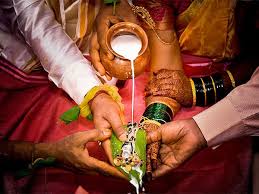
In a recent ruling, the Lucknow bench of the Allahabad High Court clarified that ‘Kanyadan,’ traditionally considered a significant ritual in Hindu marriages, is not a mandatory practice under the Hindu Marriage Act. The court emphasized that only ‘Saptapadi’ or the ritual of ‘Saath Phere’ (seven rounds) is essential for solemnizing a Hindu marriage, as outlined in Section 7 of the Act.
The case in question involved a revision petition filed by Ashutosh Yadav, challenging a criminal case related to a matrimonial dispute. Ashutosh Yadav had requested the court to re-summon witnesses, including the plaintiff, to establish the validity of his wife’s marriage. However, the court rejected this request, citing the provisions of the Hindu Marriage Act.
Justice Subhash Vidyarthi, presiding over the single bench, highlighted that ‘Saptapadi’ holds paramount importance in Hindu marriages according to the Act. This ritual signifies the commitment between the bride and groom, symbolized by taking seven rounds around the sacred fire. The court reiterated that ‘Kanyadan,’ where the bride’s family formally gives her away to the groom, is not a legal requirement for a valid Hindu marriage.
Traditionally, ‘Kanyadan’ is a symbolic gesture where the bride’s parents, usually her father, offer her to the groom amidst recitation of sacred verses and the presence of the sacred fire. It symbolizes the groom accepting the responsibility of caring for the bride, respecting her, and treating her as an equal partner in their marital journey.
The ritual of ‘Saptapadi,’ on the other hand, signifies the vows exchanged between the bride and groom during the wedding ceremony. Each of the seven rounds represents promises related to their future life together, including mutual respect, shared responsibilities, and commitment to each other’s well-being.
The court’s ruling underscores the legal perspective on Hindu marriages, emphasizing the significance of ‘Saptapadi’ as the essential ceremony for solemnizing such unions. This decision clarifies misconceptions regarding the mandatory nature of ‘Kanyadan’ and reaffirms the importance of understanding legal provisions governing marital practices in India.
For individuals involved in matrimonial disputes or seeking clarity on Hindu marriage rituals, it is crucial to consult legal experts and refer to the relevant sections of the Hindu Marriage Act for accurate guidance and interpretation. Understanding the legal framework ensures adherence to lawful procedures and upholds the sanctity of marital bonds in accordance with Indian laws.



